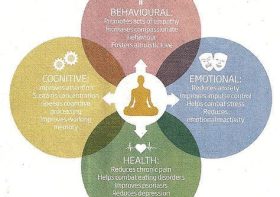The Psychological Aspects of Weight Loss: Mind Over Matter

When it comes to weight loss, most people focus solely on the physical aspects – diet and exercise. However, the psychological factors play a significant role in achieving successful and long-term weight loss. The saying “mind over matter” holds true when it comes to shedding those extra pounds. In this article, we will delve into the psychological aspects of weight loss and explore how the power of the mind can be harnessed to achieve our desired goals.
The Power of Belief
One of the primary psychological factors that influence weight loss is belief. Our mindset and attitude towards the weight loss journey can either propel us forward or hold us back. If we believe that we are capable of reaching our weight loss goals and have a positive attitude towards the process, we are more likely to stay motivated and committed to our plan. On the other hand, self-doubt and negative thoughts can demotivate us and hinder our progress.
HTML Markup:
<h1>The Power of Belief</h1>
<p>One of the primary psychological factors that influence weight loss is belief. Our mindset and attitude towards the weight loss journey can either propel us forward or hold us back. If we believe that we are capable of reaching our weight loss goals and have a positive attitude towards the process, we are more likely to stay motivated and committed to our plan. On the other hand, self-doubt and negative thoughts can demotivate us and hinder our progress.</p>
Breaking Free from Emotional Eating
Emotional eating is a common psychological struggle that many people face during their weight loss journey. Stress, boredom, sadness, or even happiness can trigger the urge to eat, leading to overeating or consuming unhealthy foods. Recognizing emotional triggers and finding healthier coping mechanisms can help break this cycle. Activities such as exercise, meditation, or engaging in hobbies can provide a sense of fulfillment and reduce the need to turn to food for emotional comfort.
HTML Markup:
<h2>Breaking Free from Emotional Eating</h2>
<p>Emotional eating is a common psychological struggle that many people face during their weight loss journey. Stress, boredom, sadness, or even happiness can trigger the urge to eat, leading to overeating or consuming unhealthy foods. Recognizing emotional triggers and finding healthier coping mechanisms can help break this cycle. Activities such as exercise, meditation, or engaging in hobbies can provide a sense of fulfillment and reduce the need to turn to food for emotional comfort.</p>
Setting Realistic Goals
A crucial aspect of successful weight loss lies in setting realistic goals. Unrealistic expectations can lead to frustration and disappointment, resulting in a lack of motivation to continue the journey. It is essential to set small, achievable goals that can be celebrated along the way. These milestones not only provide a sense of accomplishment but also keep us motivated to continue making progress.
HTML Markup:
<h2>Setting Realistic Goals</h2>
<p>A crucial aspect of successful weight loss lies in setting realistic goals. Unrealistic expectations can lead to frustration and disappointment, resulting in a lack of motivation to continue the journey. It is essential to set small, achievable goals that can be celebrated along the way. These milestones not only provide a sense of accomplishment but also keep us motivated to continue making progress.</p>
Overcoming Self-Sabotage
Self-sabotage is a common psychological barrier that can hinder weight loss progress. It involves engaging in behaviors or thoughts that sabotage our efforts without realizing it. Procrastination, making excuses, or indulging in self-criticism are examples of self-sabotaging behaviors. Overcoming self-sabotage requires self-awareness and a willingness to address the underlying emotional issues that drive these behaviors. Seeking support from a therapist or joining a support group can be beneficial in overcoming self-sabotage tendencies.
HTML Markup:
<h2>Overcoming Self-Sabotage</h2>
<p>Self-sabotage is a common psychological barrier that can hinder weight loss progress. It involves engaging in behaviors or thoughts that sabotage our efforts without realizing it. Procrastination, making excuses, or indulging in self-criticism are examples of self-sabotaging behaviors. Overcoming self-sabotage requires self-awareness and a willingness to address the underlying emotional issues that drive these behaviors. Seeking support from a therapist or joining a support group can be beneficial in overcoming self-sabotage tendencies.</p>
Building a Support System
The weight loss journey can be challenging, and having a strong support system can make a significant difference. Surrounding yourself with individuals who share similar goals or who provide encouragement and accountability can help you stay on track. It could be friends, family members, or joining a weight loss program or community. Sharing successes, challenges, and receiving support from others who are also striving for weight loss creates a positive environment for growth.
HTML Markup:
<h2>Building a Support System</h2>
<p>The weight loss journey can be challenging, and having a strong support system can make a significant difference. Surrounding yourself with individuals who share similar goals or who provide encouragement and accountability can help you stay on track. It could be friends, family members, or joining a weight loss program or community. Sharing successes, challenges, and receiving support from others who are also striving for weight loss creates a positive environment for growth.</p>
Celebrating Non-Scale Victories
Weight loss is not solely measured by the number on the scale. Celebrating non-scale victories is crucial for maintaining a positive mindset and motivation. Non-scale victories can include fitting into old clothes, feeling more energetic, improved sleep quality, or receiving compliments on your appearance. Acknowledging and celebrating these achievements reinforces the progress made and encourages perseverance.
HTML Markup:
<h2>Celebrating Non-Scale Victories</h2>
<p>Weight loss is not solely measured by the number on the scale. Celebrating non-scale victories is crucial for maintaining a positive mindset and motivation. Non-scale victories can include fitting into old clothes, feeling more energetic, improved sleep quality, or receiving compliments on your appearance. Acknowledging and celebrating these achievements reinforces the progress made and encourages perseverance.</p>
Conclusion
While diet and exercise are essential components of weight loss, the psychological aspects cannot be overlooked. By harnessing the power of belief, breaking free from emotional eating, setting realistic goals, overcoming self-sabotage, building a support system, and celebrating non-scale victories, we can maximize our chances of achieving long-term weight loss success. Remember, weight loss is a journey that requires a strong mind and positive attitude – it truly is mind over matter.
HTML Markup:
<h2>Conclusion</h2>
<p>While diet and exercise are essential components of weight loss, the psychological aspects cannot be overlooked. By harnessing the power of belief, breaking free from emotional eating, setting realistic goals, overcoming self-sabotage, building a support system, and celebrating non-scale victories, we can maximize our chances of achieving long-term weight loss success. Remember, weight loss is a journey that requires a strong mind and positive attitude – it truly is mind over matter.</p>


